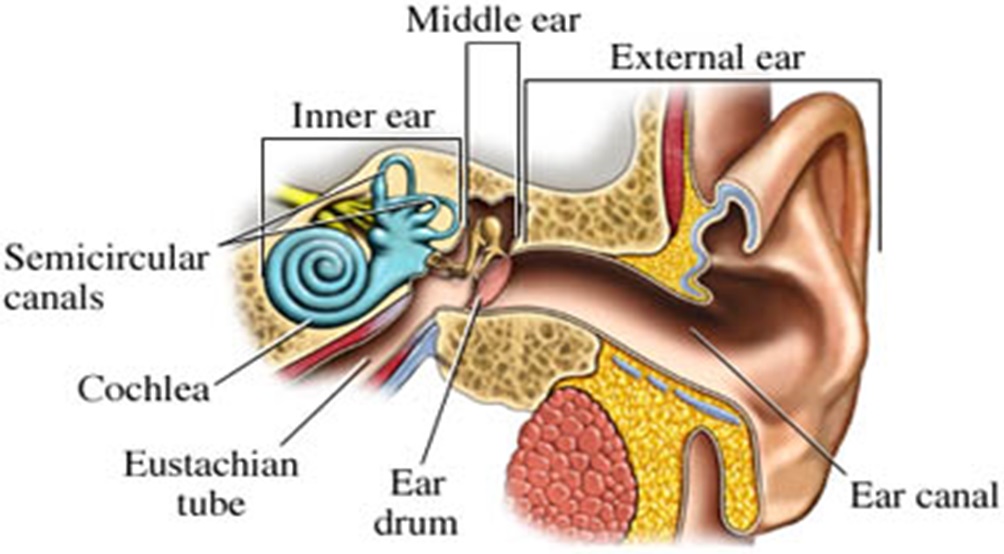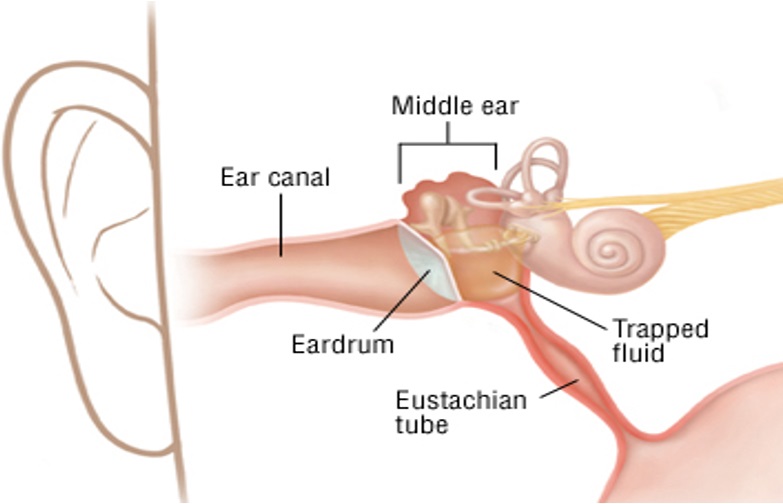Barotrauma is an injury caused by the air pressure changes. Usually there will be a discomfort sensation in the ear due to air pressure differences between the inside and outside of the ear. It causes pain in the ears and sometimes may cause hearing loss.
How Barotrauma Affect Hearing

http://www.mountsinai.org/patient-care/health-library/diseases-and-conditions/barotrauma
The ear is divided into three parts, the outer ear, the middle ear and the inner ear. The middle ear is located between the outer ear and the inner ear. The middle ear contains air spaces, ossicles bone and the Eustachian tube. Eustachian tube is a connector between middle ear to the nose and throat.
In normal circumstances, the air pressure in the middle ear (which separated with ear drum from aouter ear) is similar to the air pressure outside. Eustachian tube opens during swallowing or chewing process to allow air to get in or out of the middle ear. This is to ensure the air pressure in the ears is equal to the external pressure.
However, the air pressure in the ear may change extremely if the Eustachian tube becomes blocked or partially blocked. This pressure changes is also called barotrauma.

http://www.drugs.com/health-guide/barotrauma.html
The development of barotrauma
Pressure changes can create vacuum in the middle ear that pulls the eardrum inwards. If this happen in a sudden situation, it may cause pain or injury to the ear.
In cases of severe barotrauma, the middle ear may be filled with clear fluid (called serous otitis media) which is drawn out of blood vessel lining in the inner ear as the body wills try to equalize pressure on both sides of the eardrum. This fluid can only dry if the Eustachian tube is open normally. Eventually the accumulating fluid may cause pain and hearing difficulty similar to a middle ear infection.
Severe barotrauma may cause eardrum rupture leading to hearing loss, but in more severe cases, this pressure difference can cause damage to the organ of hearing as well as problem to the balance system.
Risk Factors
High risk activities that may cause exposure to abrupt pressure changes in the ears:
- Boarding a flight
- Divers
- Hiking
- Exposure to very loud sound like bomb blasting
- Extreme sport like freestyle higher building/ground jumping
Factors causing the eustachian tube does not work include:
- Nasal allergy or cold
- Infections to the middle ear
- Abnormal congenital eustachian tube
- Tumors that affect the function of the eustachian tube
- Cleft palate or lip
Signs Barotrauma
- Discomfort or pain in the ear
- Feeling ear fullness
- The pressure in the ear
- Ringing in the ear (Tinnitus)
- Ear bleeding – in extreme cases
- Hearing problem
Prevention
- In cold or nasal allergy, avoid doing activities that involve sudden changes in pressure. Get treatment and advice from a doctor before resuming activities.
- Ear plugs usage will help to minimize the effects of pressure changes in the ear.
- During flight, it is advisable to chew some food or swallow during takeoff and landing.
- For diving, divers are advised to dive and rise slowly to allow air pressure to be balanced naturally.
Audiological Management
Audiology tests conducted in patients with barotrauma is:
- Tympanometry Test
This test is to measure the function of the middle ear. Tympanometry test results provide information such as the state of the middle ear pressure is too negative, fluid in the middle ear or eardrum perforated. - Pure tone audiometry test
The test to determine whether an auditory level barotrauma impact on the hearing. In some cases will cause conductive hearing impairment at least at the level of mild to moderate customers.
Conclusion
Changes in air pressure in the ear or barotrauma can occur to anyone regardless of age. Barotrauma usually can be treated and rehabilitated but there are situations barotrauma effect persist and affecting hearing. Please contact your Audiologist at nearby hospital to get information and advice related to barotrauma and its effect on hearing.
References
- Brandon G. Bentz, MD, and C. Anthony Hughes, MD. Barotrauma. http://american-hearing.org/disorders/barotrauma/
- Ashutosh Kacker, MD, BS, Professor of Clinical Otolaryngology, Weill Cornell Medical College, and Attending Otolaryngologist, New York-Presbyterian Hospital, New York, NY. Ear Barotrauma. https://www.nlm.nih.gov/medlineplus/ency/article/001064.htm
- http://advancedotolaryngology.com/patient-education/ear-barotrauma/
- Barotrauma – A guide to Hearing Loss. http://www.medic8.com/ear-disorders/hearing-loss/barotrauma.html
- Middle Ear Barotrauma. http://www.scuba-doc.com/Midearbt.html
What is ear barotrauma?http://www.saintlukeshealthsystem.org/health-library/ear-barotrauma
| Last Reviewed | : | 30 May 2018 |
| Writer | : | Rosnani bt. Rajikan |
| Accreditor | : | Khadijah Azura bt. Salim |







